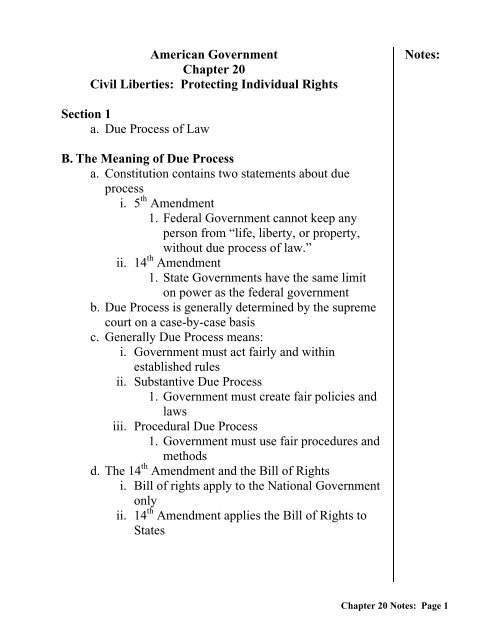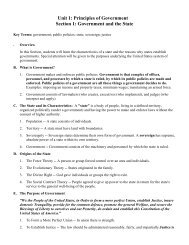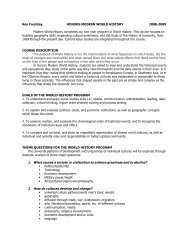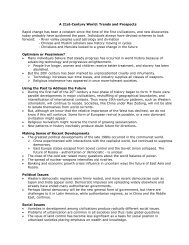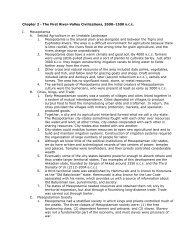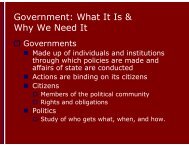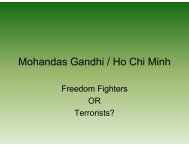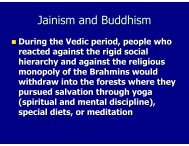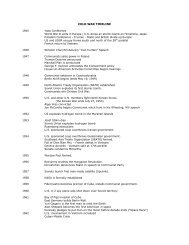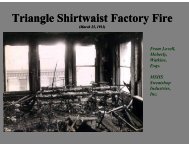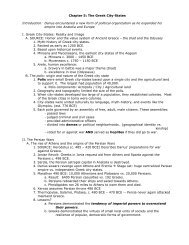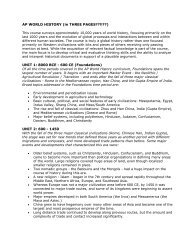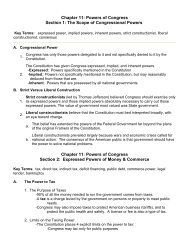Chapter 20 - Civil Liberties: Protecting Individual Rights
Chapter 20 - Civil Liberties: Protecting Individual Rights
Chapter 20 - Civil Liberties: Protecting Individual Rights
Create successful ePaper yourself
Turn your PDF publications into a flip-book with our unique Google optimized e-Paper software.
American Government<strong>Chapter</strong> <strong>20</strong><strong>Civil</strong> <strong>Liberties</strong>: <strong>Protecting</strong> <strong>Individual</strong> <strong>Rights</strong>Notes:Section 1a. Due Process of LawB. The Meaning of Due Processa. Constitution contains two statements about dueprocessi. 5 th Amendment1. Federal Government cannot keep anyperson from “life, liberty, or property,without due process of law.”ii. 14 th Amendment1. State Governments have the same limiton power as the federal governmentb. Due Process is generally determined by the supremecourt on a case-by-case basisc. Generally Due Process means:i. Government must act fairly and withinestablished rulesii. Substantive Due Process1. Government must create fair policies andlawsiii. Procedural Due Process1. Government must use fair procedures andmethodsd. The 14 th Amendment and the Bill of <strong>Rights</strong>i. Bill of rights apply to the National Governmentonlyii. 14 th Amendment applies the Bill of <strong>Rights</strong> toStates<strong>Chapter</strong> <strong>20</strong> Notes: Page 1
C. Police Powera. Authority of each state to act to protect and promotethe public health, safety, morals, and general welfarei. In other words to help people live wellb. Often protecting people, creates a conflict with civilrightsi. Courts then have to maintain a balancebetween the two1. Example: Drunk Drivingc. Search Warranti. A court order authorizing a searchd. Courts have held that public well-being was the mostimportanti. Promote health, limit sale of alcoholicbeveragesii. Promote safety, forbid concealed weapons, useof seat belts, punish drunk driversiii. Promote morals, outlawing gambling, sale ofobscene materials, prostitutioniv. Promote the general welfare, education laws,limit profits of public utilitiesNotes:D. The Right of Privacya. Not specifically mentioned in constitution, howevercourts have continually held it to be “the right to befree, except in very limited circumstances, fromunwanted governmental intrusions into one’sprivacy.” (Stanley v. Georgia, 1969)b. Roe V. Wadei. Most controversial case involving the right ofprivacyii. The Supreme Court found a Texas lawunconstitutional1. The law made abortion a crime<strong>Chapter</strong> <strong>20</strong> Notes: Page 2
c. Later Reproductive <strong>Rights</strong> Casesi. The Courts have made many revisions sinceRoe V. Wade, but the basic constitutional rightstill standsNotes:Section 2d. Freedom and Security of the PersonE. Slavery and Involuntary Servitudea. Amendment 13 was added to the Constitution in1865, outlawing slavery or involuntary servitudei. The courts have held that the draft andimprisonment are not classified as involuntaryservitudeb. The 13 th Amendment: Section 2i. With support of the 13 th Amendment, <strong>Civil</strong><strong>Rights</strong> Act of 1866, and <strong>Civil</strong> <strong>Rights</strong> Act of1964, outlaw racial discrimination1. Bias, UnfairnessF. The Right to Keep and Bear Armsa. 2 nd Amendment states “ A well regulated militiabeing necessary to the security of a free State, theright of the people to keep and bear arms, shall notbe infringed” Constitutioni. Many politicians argue that the amendmentalso supports an individual’s right to “beararms”ii. State’s have the right to limit armsG. Security of Home and Persona. The 3 rd Amendmenti. Forbids the housing of soldiers in privatehomes1. Never been the subject of a SupremeCourt case<strong>Chapter</strong> <strong>20</strong> Notes: Page 3
. The 4 th Amendmenti. Designed to prevent the use of writs ofassistance1. Blanket search warrantsc. Probable Causei. Police officers cannot search for evidenceunless they have a warrant1. Must be based on probably causea. A reasonable suspicion of crimed. Arresti. The Seizure of a personii. Do not need a warrant to arrest an individuale. Automobilesi. The Court has held that officers do not needsearch warrants for vehicles1. Just need probable Causef. The Exclusionary Rulei. Evidence gained as the result of an illegal actby police cannot be used at the trial of theperson from whom it was seized1. Adopted by the Courts, even though notexplicitly stated in the 4 th amendmentii. Rule was laid down in Weeks v. UnitedStates,1914g. Map v. Ohioi. 1961 case expanded the Exclusionary rule tostates based on the 14 th Amendmenth. Cases Narrowing the Scope of the Exclusionary Rulei. Multiple cases through the years have allowedsome police mistakes regarding evidencei. Drug Testingi. The Court has held that they can be conductedwithout either warrants or even any indicationof drug use by those who must take themNotes:<strong>Chapter</strong> <strong>20</strong> Notes: Page 4
j. Wiretappingi. Kratz v. United States, 1967 found evidencefound through wiretapping was not eligible incourt1. However, recent cases involving cellphone wiretapping has not been foundunconstitutionalNotes:Section 3k. <strong>Rights</strong> of the AccusedH. Habeas Corpusa. Writ of habeas corpusi. Intended to prevent unjust arrests andimprisonmentsii. Commands that the prisoner be brought beforethe court and that the office show cause whythe prisoner should not be released1. Cannot be suspended “unless when incases of Rebellion or Invasion the publicSafety may require it”a. Abraham Lincoln suspended thewrit in 18612. Also suspended in Hawaii after PearlHarborI. Bills of Attaindera. Legislative act that inflicts punishment without acourt triali. England’s parliament during the colonialperiod pass many bills of attainderJ. Ex Post Facto Lawsa. A Law passed after the facti. A criminal law, defining a law or providing forits punishment<strong>Chapter</strong> <strong>20</strong> Notes: Page 5
ii. Applies to an act committed before its passageiii. Works to the disadvantage of the accusedb. Neither Congress or the State Legislatures may passsuch lawsNotes:K. Grand Jurya. Formal device by which a person can be accused of aserious crimei. A body of 16-24 persons from the federaldistrict courtii. Used to determine indictment or to drop thecharges1. A formal complaint that the prosecutorlays before a grand juryb. Grand Jury is provided by the 5 th Amendmenti. However only provision not covered in the 14 thAmendmentii. Thus states are not required to provide a grandjuryL. Double Jeopardya. 5 th Amendment guarantee against being tried for thesame crime twiceb. Cannot be convicted on the same crime in bothfederal and state courtsi. Sex Predators however can be confined afterbeing released from prison1. The courts have considered that theprotection of the public from harmM. Speedy and Public Triala. Speedy Triali. 6 th Amendment guarantee that ensures that thegovernment will try a person accused of acrime without unnecessary delay<strong>Chapter</strong> <strong>20</strong> Notes: Page 6
1. Most cases must be within 100 days oftheir arrestb. Public Triali. 6 th Amendment also guarantees that the trialmust be public1. However a trial cannot be too speedy ortoo public2. Major battle between freedom of pressand the protection of a fair trial fromundue media speculationNotes:N. Trial by Jurya. 6 th Amendment guarantee that says an accusedperson must be tried “by an impartial jury”i. However states may not us trial by jury onminor casesii. A defendant may seek a “change of venue” dueto prejudice in the state and federal district inwhich the case is to be held1. Defendant can waive their right to trial byjurya. Called Bench trialO. Right to An Adequate Defensea. 6 th Amendment also provides the defendant:i. “to be informed of the nature and cause of theaccusation”ii. “Be confronted with the witnesses against”them and question them in open courtiii. “To have compulsory process for obtainingwitnesses in their favor”iv. “To have the Assistance of Counsel for hisdefense”b. Intended to prevent the cards from being stacked infavor of the prosecution<strong>Chapter</strong> <strong>20</strong> Notes: Page 7
P. Self-Incriminationa. 5 th Amendment provides protections for defendants,that for the burden of proof on the prosecutionb. Applying the Guaranteei. A person can “claim the fifth”1. Ability to not testify or answer questionsthat might incriminate oneselfii. Does not include fingerprinting, photography,submitting a handwriting sample, police lineup,etc.1. Must also be allowed to have counsel2. If counsel is denied, then confession cannot be used in courtc. Miranda v. Arizonai. The court said that it would no longer upholdconvictions in any cases in which suspectshave not been told of their constitutional rightsbefore police questioningii. Miranda Rule1. Told of his or her right to remain silent2. Anything they say can be used in court3. Right to have an attorney present duringquestioning4. If unable to hire an attorney, one will beprovided5. they may bring police questioning to anend at anytimeNotes:Section 4d. PunishmentQ. Bail and Preventative Detentiona. Baili. Sum of money that accused may be required topost (deposit with the court) as a guarantee thathe or she will appear in court<strong>Chapter</strong> <strong>20</strong> Notes: Page 8
1. Not guaranteed bail, just that it won’t beexcessiveb. Preventive Detentioni. A federal judge can order that the accused beheld, without bail, when there is good reason tobelieve that he or she will commit anotherserious crime before trialNotes:R. Cruel and Unusual Punishmenta. 8 th Amendment forbids “cruel and unusualpunishment”i. Capital Punishment is not necessarilyconsidered cruel and unusual punishmentii. Court has held that punishment should fit theseverity of the crime1. Also cannot be denied medical treatmentin jailS. Capital Punishmenta. Punishment by deathb. Court has avoided the charged issue, however hasmade a couple decisions in regard to capitalpunishmenti. Can be imposed for crimes resulting in thedeath of the victimii. Cannot be imposed on mentally retardedcriminalsT. Treasona. Only crime that is defined in the Constitutionb. Can consist of only two thingsi. Levying war against the United Statesii. “Adhering to their Enemies, giving them Aidand Comfort”<strong>Chapter</strong> <strong>20</strong> Notes: Page 9
c. Not one can be punished, unlessi. Testimony of two witnesses to the same actionii. Confession in open Courtd. States also have treason lawsNotes:<strong>Chapter</strong> <strong>20</strong> Notes: Page 10


